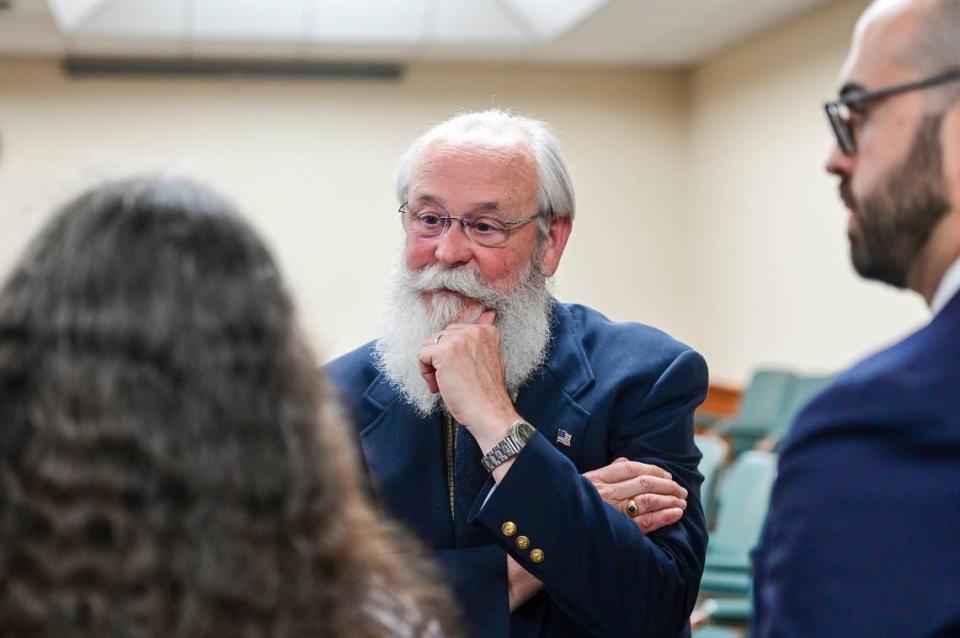‘Un-American’ or another police ‘tool’? DNA profile use in Idaho murder case forms division
An early battle in the trial of Bryan Kohberger is playing out over a key piece of evidence in the Idaho murder case, and its outcome could set court precedent for how the nation’s police investigate suspects of violent crime.
The recent revelation that the FBI submitted DNA to public genealogy websites to pinpoint Kohberger as the alleged killer is raising significant legal questions, including with his public defense. Law enforcement’s latest crime-solving technique, used in the quadruple homicide case, was whispered about for months, but only officially confirmed by prosecutors last week.
Federal agents employed DNA in the active investigation in a way typically reserved for cold cases, according to court records. The relatively new, unvetted and largely unregulated method has drawn scrutiny over possible limits on civil liberties, in part from the lack of a paper trail.
The technique, known as investigative genetic genealogy (IGG), provided the lead that ended at Kohberger, Idaho prosecutors said. The process entailed using popular ancestry websites to build a family tree from DNA discovered at a crime scene.
Four University of Idaho students were stabbed to death on Nov. 13 at an off-campus home on King Road in Moscow. The victims were seniors Madison Mogen and Kaylee Goncalves, both 21; and junior Xana Kernodle and freshman Ethan Chapin, both 20.
Detectives found “touch DNA” on a combat-style knife sheath located on the bed of one of the four victims, Kohberger’s defense said in a court record last week. They argued for access to the IGG records, stating the prosecution “is hiding its entire case.”
“Presumably, the defense is expected to accept at face value that the sheath had touch DNA just waiting for testing by all the FBI’s myriad resources,” read the court record signed by public defender Jay Logsdon. “Perhaps unsurprisingly, Mr. Kohberger does not accept that his defense does not need this information.”
Meanwhile, the prosecution aims to withhold the documents from that investigative process, which was not disclosed by officials involved in the case until last week. Critics say such legal maneuvering yields far-reaching questions about criminal civil rights and law enforcement transparency.
But IGG experts have fewer worries, including surrounding personal privacy. The method, they told the Idaho Statesman and McClatchy, should be considered just another investigative technique — be it a more modern one driven by scientific advances — at law enforcement’s disposal to zero in on violent criminal suspects.
Barbara Rae-Venter helped police in 2018 identify Joseph James DeAngelo as the Golden State Killer — the man responsible for a string of murders, rapes and kidnappings throughout California in the 1970s and ‘80s. Especially in light of IGG leading investigators to Kohberger, she wants to see the method go mainstream in policing.
“IGG is an investigative tool, just like fingerprints, or the psychic who says where the missing person is,” Rae-Venter told the Statesman by phone. “It’s the eyewitness who says they saw somebody with whatever description leaving the premises. We’re trying to narrow down who the suspect is, that’s all we’re doing.”
Fellow IGG expert Christi Guerrini, assistant professor at Baylor College of Medicine in Texas, likened investigators use of public genealogy tools to that of a public tip line. The information from both techniques is never used as the basis for an arrest, Guerrini told McClatchy by phone, but it thins the pool of suspects for law enforcement.
“In any investigation, when there are no suspect leads, investigators are basically looking for a needle in an impossibly large haystack that they are trying to make more manageable,” Guerrini said. “A rationale for not including the family tree information in court proceedings is that it’s not the basis of an arrest. It helps shrink the haystack, but the person was not arrested based on who they were related to.”
Latah County Prosecutor Bill Thompson, who is leading the case against Kohberger, argued similarly in a court filing released last week. In response to the demand by Kohberger’s attorneys for all IGG records as part of the discovery process to mount a credible defense, he requested the Idaho district judge overseeing the case rule in the state’s favor.
The information the FBI obtained through IGG, Thompson wrote, is immaterial to how police established probable cause to arrest and charge the former Washington State University graduate student of criminology. Judge John Judge of Idaho’s 2nd Judicial District Court in Latah County will hold a hearing Tuesday on the matter.

Kohberger, 28, awaits a scheduled Oct. 2 trial after a grand jury last month indicted him on four counts of first-degree murder and one count of felony burglary. Prosecutors could seek the death penalty in the case but have not stated their intentions yet.
Thompson revealed in the court filing that the FBI developed a family tree after submitting the DNA from the knife sheath to one or more unnamed genealogy websites. Further vetting of the information led federal agents to send a tip to local police to investigate Kohberger, according to the court record.
However, IGG did not take the place of more traditional investigative techniques, which Idaho police pursued once the FBI forwarded the tip, Thompson said.
“The IGG process pointed law enforcement toward (Kohberger), but it did not provide law enforcement with substantive evidence of guilt,” Thompson wrote.
Moreover, he said, the FBI produced limited records from its creation of the family tree that led the agency to land on Kohberger. And, per Department of Justice policy on the use of IGG techniques, federal agents removed the DNA profile related to the Ka-Bar brand leather knife sheath once Kohberger was arrested, Thompson wrote.
“The state has not seen — nor does the state possess — these records or copies of these records,” he said.
Idaho case could make IGG more accepted
IGG, more often associated with decades-old, unsolved crimes, is becoming increasingly popular in active investigations. The practice involves sending a DNA profile to public genealogy websites like Ancestry.com or 23andMe, and awaiting the return of familial ties. Neither of the two direct-to-consumer services cooperates with law enforcement, each reported on their websites.
So instead, investigators usually lean on the smaller genealogy services GEDMatch and FamilyTreeDNA, Rae-Venter said. But each company has several million fewer DNA profiles than their more widely known competitors.

A case of significant national attention such as Kohberger’s stands to make the technique more commonplace beyond cold cases.
“Right now, it’s only being used in current cases where there’s some urgency involved,” Rae-Venter said. “I would hope that it becomes more universally used.”
It remains unclear why police did not identify using IGG during the homicide investigation in the probable cause affidavit filed to justify Kohberger’s arrest in late December.
The affidavit instead referenced location data from Kohberger’s cellphone and video footage of a white sedan as it made trips between Pullman and the victims’ off-campus rental home in Moscow as evidence he was the suspect. Kohberger owned a white 2015 Hyundai Elantra.
In late December, investigators also obtained trash from Kohberger’s parents’ home in eastern Pennsylvania, where he was staying at the time of his arrest. DNA from the trash was identified by the Idaho State Police crime lab in Meridian as belonging to the biological father of the person whose DNA was found on the knife sheath.
But the absence of any information about law enforcement’s use of IGG until last week — more than seven months into the closely watched quadruple homicide case — has concerned attorneys keeping an eye on its legal process. Media reports, including from Slate, began to surface as early as January that detectives incorporated the DNA method to help solve the crime that instantly gained national attention.
Ritchie Eppink, a Boise-based civil rights attorney formerly with the ACLU of Idaho, questioned law enforcement’s decision in the case to conceal its use of any investigative techniques. The prosecution’s push to keep the records from Kohberger’s defense team is equally problematic regarding due-process rights of the accused, he told the Statesman.
“Secret evidence is not fair, it’s un-American, and it’s not a good way to instill confidence in our courts,” Eppink said in a phone interview. “There are constitutional implications all over this, especially when the state then wants to hide where it did (forensic genealogy) and how it did it.”
The nondisclosure of IGG in the affidavit also came as a surprise to Rae-Venter.
“I’m not sure what drove that,” she said. “Because if it was me, I’d be bragging that IGG had helped to solve the crime.”
Prosecution argues against disclosure
The prosecution seeks to protect the personally identifying information of Kohberger’s relatives, and the public genealogy services that law enforcement used in its investigation, Thompson wrote in his court filing. Idaho criminal law also does not require the state to turn over records from the use of IGG — at least not without the defense first obtaining a court order, he said.
The Idaho law “is broad, but it is not a free-for-all,” Thompson wrote.

In addition, the prosecution does not plan to introduce IGG evidence at trial, the information does not negate the defendant’s guilt, nor does the technique by definition represent a scientific test, Thompson argued. The defense contested the last two points in its response.
“Frankly, the fact that members of the FBI are so concerned about permitting Mr. Kohberger to know what they were up to with what was supposedly his DNA, does not give one the impression that there is ‘nothing to see here’ as the state seems to imply,” Logsdon challenged.
David Gurney, director of the IGG Center and assistant professor of law and society at Ramapo College of New Jersey, predicted the prosecution is likely to win this pre-trial court fight. He cited several reasons, including that the genealogy data was not the basis of Kohberger’s arrest.
“I expect that the Idaho court will side with the state and rule that the IGG materials are not required to be turned over to the defense under Idaho’s discovery rules,” Gurney told McClatchy by email. “Nearly every court that has heard similar motions has granted them.”
Gurney, like Thompson in his court filing, addressed the question of possible violations of Kohberger’s Fourth Amendment rights, which protects against unreasonable searches and seizures — in this circumstance related to a suspect’s DNA.
“That argument has been roundly defeated in every court where it has been raised,” he said. “There is no Fourth Amendment privacy interest in biological evidence left by a murderer at a crime scene — full stop.”
Gurney expected the state to instead introduce its evidence directly comparing the DNA profile from the knife sheath to the DNA cheek swab law enforcement later obtained from Kohberger once he was taken into custody.
At the moment, no official guidelines exist about the specific kinds of records that law enforcement agencies must keep when using IGG, he added.
Justice Department policy does direct investigating agencies, such as the FBI, to request DNA platforms remove any profiles they made in their search for genealogical connections to suspects. Thompson affirmed that occurred in his court filing, adding that the FBI produced limited records while employing IGG.
“The genealogy conducted by the FBI resulted in a lead that pointed law enforcement to (the) defendant, but it did not result in the creation of many documents or records,” Thompson wrote. “The FBI did not download or create copies of those records.”
Those records included only notes FBI agents kept as they built Kohberger’s family tree, and records produced to document removal of the DNA profile, he said.
However, the Justice Department policy also states that all IGG “data shall be retained by the investigative agency for potential use during prosecution and subsequent judicial proceedings.”
The FBI and Justice Department each refused to explain why Idaho prosecutors wrote in a court filing that all such data was not retained regarding Kohberger. They first claimed to be subject to the case’s gag order — in a criminal case to which neither are named as a party — before simply declining to comment.
“Mr. Kohberger has reasons to be extremely suspicious of the IGG used in this case,” wrote Logsdon, one of his public defenders. “Rather than seeing it as some sort of complex tree building that led to him, it appears far more like a lineup where the government was already aware of who they wanted to target.”
Eppink, the Idaho civil rights attorney, said he worried that newer police investigative technologies, such as IGG, continue to encroach upon our basic notions of criminal due process. Courts are forced to play catch-up, which law enforcement exploits, he said.
“Even to the extent that there are privacy implications of disclosing the names of matches on genealogy databases, that’s not grounds that I can imagine for withholding that information from the defense team,” he said. “That law enforcement followed a process here — and, in fact, the process they’re directed to follow where they cover their tracks — it seems to me to raise a lot of concerns and questions, including, ‘Why have such a process if what you’re doing is fair and accurate?’ ”

